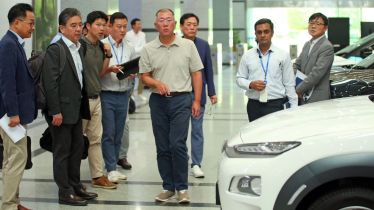Hyundai Motor Group Executive Chair, Euisun Chung visited India to review the company’s strategy which lays the foundation for future growth and supports its leadership in the Indian market. Chung visited Hyundai Motor India Engineering (HMIE) located in Hyderabad, the brand’s R&D hub in India, and the automobile plants in Chennai on August 7 and discussed mid- to long-term growth strategies with local employees.
India is one of the world’s most promising automotive markets with 4.76 million new vehicles that were sold last year behind China and the U.S. The passenger car market accounted for 3.8 million units and is expected to exceed 5 million units by 2030. The country is also becoming an increasingly important centre for electric vehicle (EV) production and sales.
The Indian government is pursuing a strong electrification policy, with the aim of increasing EV sales to 30 percent of total vehicle sales by 2030. Chung’s visit to India included a review of the strategic importance of India as a future mobility hub. With this in mind, preparations for a new Group leadership position in EVs were also discussed given the country that will be a competitive EV battleground in the years to come.
HMIE plays an important role in increasing sales in the Indian market and works closely with the Hyundai-Kia Namyang R&D centre in Korea to develop vehicles that are tailored for the Indian market. In addition to strengthening local R&D capabilities, HMIE will expand its role as a hub for future mobility research, including electrification, autonomous driving, and the development of voice recognition technology in local Indian languages.
To this end, construction of a new test facility began last year. Chung stressed that in order to establish a position as the first mover, it is crucial to deliver products that exceed customer expectations in a timely manner and that HMIE should be a driving force for the Group’s growth in the Indian market.
The Chairman visited the Hyundai Motor India plants in Chennai and discussed with the employees mid- to long-term development plans for production and sales. In particular, he considered the reorganization of the automotive value chain in the works, with a focus on India.
By systematically analyzing the Indian market and its customers, Hyundai Motor aims to grow quantitatively by strengthening its leadership in SUVs and expanding its EV line-up and establishing itself as the most trusted brand in India through customer-centric activities and social contributions.
The Group has also undertaken various CSV activities in the areas of forest conservation, bridging the education gap and road safety. In addition, the Group will build an optimal production system to efficiently support vehicle production in the mid to long term and create a sustainable EV ecosystem to drive growth as a leading electrification brand.
SUVs are expected to account for 48 percent of the country’s expected 5 million vehicle unit sales by 2030, while EVs are expected to reach 1 million units. Hyundai Motor will continue to introduce SUV models specialized for the Indian market, including the compact SUV Exter, which was launched in July.
Hyundai will introduce five EV models by 2032 and expand the number of EV charging stations to 439 by 2027 by leveraging the strength of the company’s sales network. In the meantime, Kia plans to strenuously target the Indian EV market based on its premium image and technological competitiveness, building on the popularity of SUVs such as the Seltos and Sonet.
First, Kia will produce small EVs optimized for the local market from 2025, and will then gradually offer various EV models and Purpose Built Vehicles (PBVs). The company will also develop an EV charging infrastructure.
Through its ‘Kia 2.0 Strategy,’ the company aims to increase its market share in India from 6.7 percent in the first half of this year to 10 percent in the coming years. Kia plans to expand its vehicle range and more than double its sales network from the current 300.
Hyundai is now firmly established as the second-best automaker in the Indian market. Following last year’s sales of 8,07,067 units, the company has sold 5,02,821 units throughout July this year, up 8.8 percent year over year. This year’s sales target is 8,73,000 units, 8.2 percent more than last year.
EV sales including Completely Knocked Down (CKD) assembled units nearly doubled from a year earlier to 1,181 units. In the future, Hyundai and Kia plan to mass-produce EV volume models at Indian plants to significantly increase EV sales in the country. Production at the Indian plants has also increased.
Cumulative production through July this year was 630,230 units, up 8.7 percent from 580,049 units last year. Hyundai Motor has expanded its production capacity accordingly. A new paint shop and additional capital investments have enabled the company to produce 824,000 units, an increase of 54,000 units from 770,000 units
